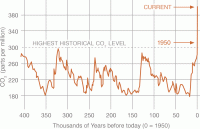(Includes excerpts from The Power to Change (Kogan Page 2020)
Climate change has become a battleground. It is not only a battle between man and nature, but also a battle between science and dogma; between scientists who deal in probabilities and many of us who mistake probabilities for guesswork.
This misunderstanding of science is fueled by opportunistic, populist politicians and media owners that thrive on stoking the flames of fear and controversy – most of whom know better but choose to leverage the electorate’s confusion about scientific matters for their own political and economic gains.
Not since Galileo’s time has science been so mistrusted – as a swarm of ill-informed or ill-intentioned anti-vax conspiracy theorists and climate skeptics infiltrate social media across the globe. The reason is hope and fear. Hope that the scientists are wrong and fear that if we were to drastically reduce our production of greenhouse gases to the degree that the scientists are recommending, it would significantly and negatively affect our economies and our standards of living. And the fear is understandable: Today’s global economy is run on fossil fuels, livestock and, to a large extent, palm oil – each of which is adversely affecting the planet as we know it in dramatic and life-changing ways.
One particularly stubborn trope reared its ugly head in my twitter feed today. “Lefty politicians and scientists have been talking about ‘global warming’ for decades. So why isn’t the Maldives underwater yet?”
And to be honest, this was the exact question that flummoxed me about climate change – until I did some research so that I could address it head-on in The Power to Change.
And the answer I found is confoundingly simple: it is because the sea level rise we are experiencing is exponential.
Let me explain by starting with three key irrefutable facts that climate change acceptors and deniers alike can all agree on:
1. The greenhouse effect is real.
Solar energy absorbed at the Earth’s surface is radiated back into the atmosphere as heat. As the heat makes its way through the atmosphere and back out to space, greenhouse gases (including water vapour, CO2 and methane) absorb much of it, thus keeping the planet ‘warm’. Without it, most of the Earth would be a frozen wasteland and we probably wouldn’t even exist.
The greenhouse effect isn’t political. It doesn’t require belief. It is fact. Like gravity.
Climate change
2. Global CO2 levels in our atmosphere have increased dramatically since the industrial revolution and have been accelerating since the mid 20th Century
Take a look at the graph from NASA. CO2 levels hovered between 200 parts per million (ppm) during ice ages, and 280 ppm during warmer interglacial periods. But the increase in CO2 over the last century is a vertical line! Today it is 414 ppm. It is increasing by more than 2 ppm a year.
Again, no politics involved, no opinions needed. It’s simply just measurement. Nothing to dispute here.
Global warming
3. This increase in CO2 levels has coincided with a ten-fold increase in human-produced CO2 emissions during the same period.
As the US Government’s National Oceanic and Atmospheric Administration graph clearly illustrates.
Again, nothing political. Just a statement of fact.
Yet what is still disputed by a die-hard group of vocal skeptics is that there is any link between #3 and #2; that the dramatic increase in human-produced CO2 is the main cause of the dramatic rise in CO2 levels in the atmosphere.
COP 26
I find this baffling, because, as NASA states: “This recent relentless rise in CO2 shows a remarkably constant relationship with fossil-fuel burning and can be accounted for by the simple premise that about 60 percent of fossil-fuel emissions stay in the air.”
The 1990s were the warmest decade on record – until the 2000s, which, in turn, were beaten by the decade to 2020.
NASA went on to declare that: “Today, we stand on the threshold of a new geologic era, which some term the ‘Anthropocene’, one where the climate is very different to the one our ancestors knew.”[1]
Rising sea levels
The global sea level is 13-20 cm higher on average today than it was 120 years ago, according to the Smithsonian Institute.[2] This rise has not been rapid – and nowhere near enough to turn Male into Atlantis.
But in its 2014 report, the Intergovernmental Panel on Climate Change (IPCC) concluded that they expect global mean sea levels to rise even further – by a massive 30cm to 100cm by 2100 “depending upon the scenario.”
How can the IPCC claim this? Because the rise in sea levels is accelerating. The IPCC’s prediction is based on a logical extrapolation of the growth in sea levels that we have seen since 1900. What many of us, including me, failed to grasp is that the rise in sea levels hasn’t been linear – it has been exponential.
Half of the rise to date has occurred in the last 25 years.[3] Throughout most of the 20th Century, the sea level rose between 1.2 mm and 1.7 mm per year on average. Today the rate is double that – around 3.4 mm per year.
If the growth continues to accelerate (which is the logical assumption), we will witness an average sea level rise of an additional 15-20cm over the next 25 years and a further rise of an extra 30-40cm during the 25 years after that. The average sea level in 2070 would then be 45-60cm (up to two feet) higher than today (and 60-80cm higher than it was in 1900).
This would be catastrophic for the Maldives as three quarters of the nation would then be under water. It would also be devastating for billions of people who live and work in low-lying coastal communities around the globe.
Yet it is the trajectory we are currently on.
The rising ocean temperature is already killing the Maldives’ coral – upon which the entire Maldivian economy depends. New breeds of coral are being planted on man-made reefs as swiftly as possible, which will all be to no avail if don’t stop the sea levels rising.
Campbell Macpherson
[1] https://climate.nasa.gov/climate_resources/24/graphic-the-relentless-rise-of-carbon-dioxide/
[2] https://ocean.si.edu/through-time/ancient-seas/sea-level-rise
[3] https://climate.nasa.gov/news/2680/new-study-finds-sea-level-rise-accelerating/

